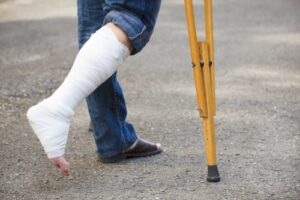In the aftermath of a personal injury incident, gathering evidence is crucial to support your claim for compensation. One vital piece of evidence often overlooked is the police report. In Kansas, as in many other states, police reports play a significant role in personal injury cases, providing essential documentation and unbiased observations of the accident scene. On this page, we will explore the importance of police reports in Kansas personal injury cases and how they can impact the outcome of your claim.
Understanding the Importance of Police Reports
When involved in a personal injury accident, such as a car collision or slip and fall incident, emotions can run high, and details may become blurred. Police officers dispatched to the scene are trained to assess the situation objectively, document relevant information, and compile a comprehensive report. These reports serve as an official record of the incident and can provide valuable insights into factors such as:
The date, time, and location of the accident.
Descriptions of the parties involved, including contact information and statements.
Witness testimonies and their contact information.
Weather and road conditions at the time of the accident.
Any citations issued or charges filed as a result of the incident.
How Police Reports Impact Your Personal Injury Case
In Kansas personal injury cases, police reports serve as crucial pieces of evidence that can significantly influence the outcome of your claim. The information contained within these reports can corroborate your version of events, establish liability, and provide a foundation for your legal arguments. Here’s how police reports can impact various aspects of your case:
Establishing Liability
Police reports often include statements from the parties involved, witnesses, and observations made by responding officers. This information can help establish who was at fault for the accident, which is essential in proving liability in a personal injury claim.
Documenting Injuries and Damages
In addition to documenting the details of the accident itself, police reports may also include observations regarding injuries sustained by those involved. While not as comprehensive as medical records, these initial assessments can provide valuable documentation of your injuries immediately following the accident.
Assisting in Negotiations
When negotiating a settlement with insurance companies or opposing parties, having a police report to support your claim can strengthen your position. It provides an unbiased account of the incident from a credible source, making it more difficult for the other party to dispute the facts.
Admissibility in Court
If your case proceeds to trial, a police report can be admitted as evidence to support your claims. Judges and juries often view police reports as reliable sources of information, lending credibility to your case.
Best Practices for Obtaining and Utilizing Police Reports
Now that we’ve established the importance of police reports in your Kansas personal injury case, let’s discuss some best practices for obtaining and utilizing this critical piece of evidence:
Report the Accident Immediately
Following a personal injury incident, it’s crucial to report the accident to the appropriate authorities as soon as possible. Contact local law enforcement to have them respond to the scene and document the details of the accident in an official police report.
Provide Accurate Information
When interacting with responding officers, be sure to provide accurate and detailed information about the accident. This includes providing your name, contact information, and a statement regarding the events leading up to the incident. Avoid making speculative or exaggerated statements that could undermine your credibility.
Request a Copy of the Police Report
Once the police report has been filed, request a copy for your records. In Kansas, accident reports are typically available through the law enforcement agency that responded to the scene or the Kansas Department of Transportation. Your personal injury attorney can also assist you in obtaining a copy of the report.
Review the Report for Accuracy
Upon receiving the police report, carefully review it for accuracy. Check for any errors or discrepancies in the information provided, such as incorrect dates, times, or descriptions of the accident. If you identify any inaccuracies, notify the appropriate authorities to have them corrected.
Use the Report to Support Your Claim
As you pursue compensation for your injuries and damages, use the police report to support your claim. Provide a copy of the report to your personal injury attorney and discuss how the information contained within can be used to strengthen your case. Your attorney can help you craft persuasive legal arguments based on the evidence presented in the report.
Seek Legal Guidance
Navigating the complexities of a personal injury case can be daunting, especially when it comes to gathering and presenting evidence such as police reports. Seek guidance from an experienced personal injury attorney, like those at Melinda Young Law Firm, who can help you understand your rights, navigate the legal process, and advocate on your behalf.
Next Steps in Your Personal Injury Case
Now that you understand the significance of police reports in your Kansas personal injury case and how to effectively utilize them, it’s time to take action. Here are the next steps to consider as you pursue compensation for your injuries:
Seek Medical Attention
Your health and well-being should always be your top priority. If you have not already done so, seek medical attention for your injuries. Even if you believe your injuries are minor, it’s essential to undergo a thorough medical evaluation to ensure you receive proper treatment and documentation of your injuries.
Consult with a Personal Injury Attorney
An experienced personal injury attorney can provide invaluable guidance and representation throughout the legal process. Schedule a consultation with an attorney at Melinda Young Law Firm to discuss the details of your case, review your options, and develop a strategy for pursuing compensation.
Gather Additional Evidence
In addition to the police report, gather any other relevant evidence to support your claim. This may include photographs of the accident scene, witness statements, medical records, and documentation of your expenses related to the accident.
Communicate with Insurance Companies
If applicable, notify your insurance company of the accident and cooperate with their investigation. Be cautious when communicating with insurance adjusters and avoid providing recorded statements or signing any documents without consulting your attorney.
Consider Settlement Negotiations
Depending on the circumstances of your case, you may have the option to negotiate a settlement with the at-fault party or their insurance company. Your attorney can help you assess any settlement offers and negotiate on your behalf to secure fair compensation.
Prepare for Litigation, if Necessary
If settlement negotiations are unsuccessful or if litigation is deemed necessary, prepare to pursue your case in court. Your attorney will guide you through the litigation process, including filing a lawsuit, conducting discovery, and representing you at trial.
Navigating a personal injury case can be challenging, but with the right guidance and representation, you can seek the compensation you deserve for your injuries and damages. At Melinda Young Law Firm, we are dedicated to advocating for injury victims and helping them achieve justice. Contact us today to schedule a consultation and take the first step toward securing the compensation you deserve.
